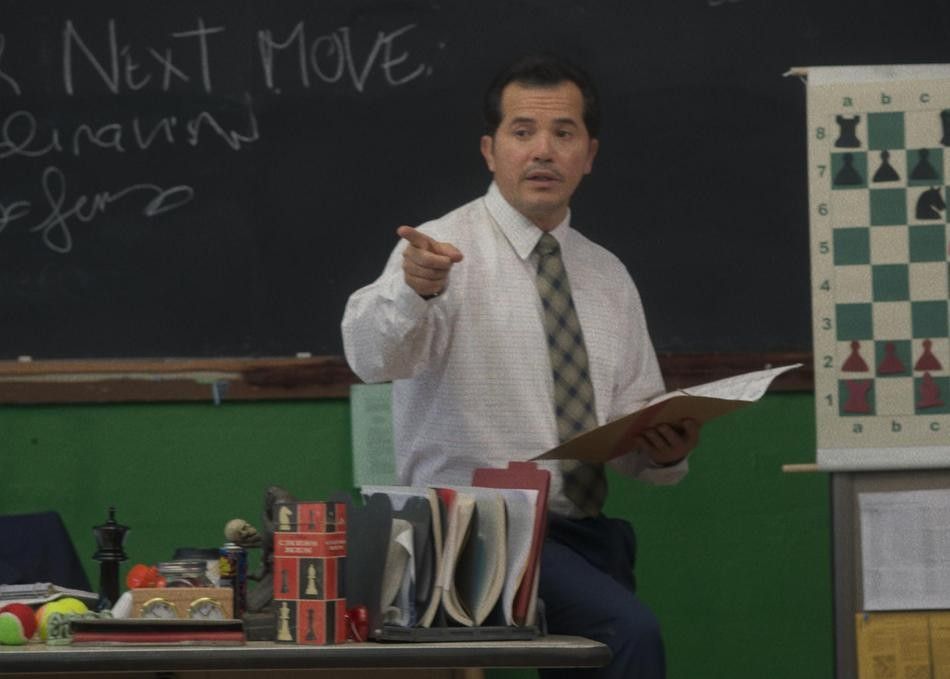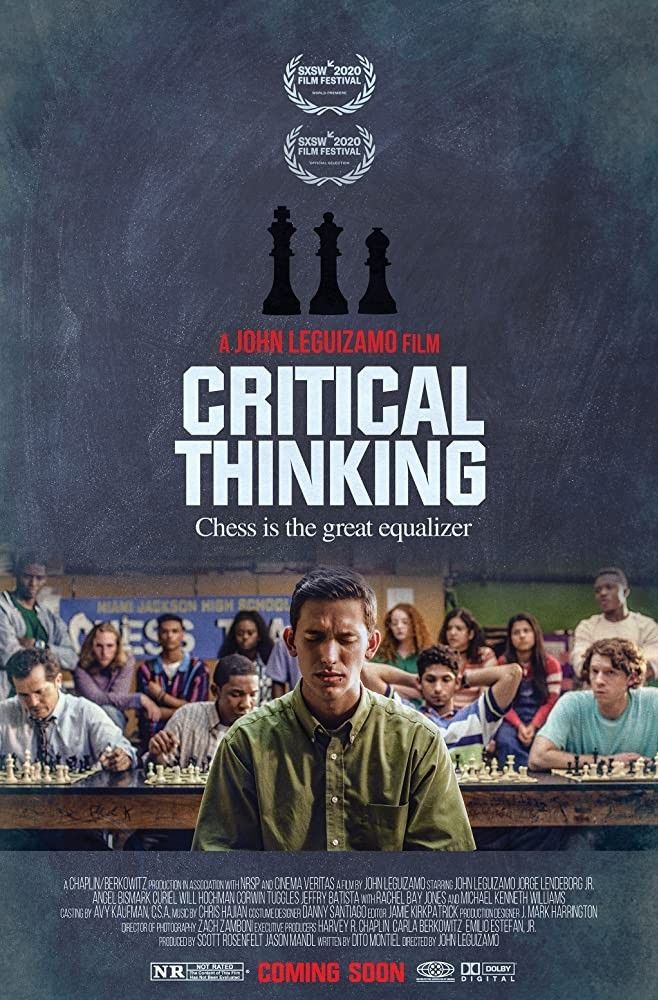
In his directorial debut, John Leguizamo had to be 16 moves ahead.
The first industry job I ever had was as a PA on a small indie film starring John Leguizamo. I saw firsthand, long ago, how he comports himself. He's a true pro. He has the kind of energy that carries a set, wisdom from having worked with many of the great living directors, and the spirit and charisma that can breathe life into material.
Leguizamo is an extremely accomplished performer. From performing stand-up and winning Tony Awards on Broadway to starring in crime dramas and musicals to producing television... he's done it all.
One thing he had yet to do... shockingly? Direct a feature film.
Well, now he's done that, too.
His film Critical Thinking was set to premiere at SXSW 2020. Recent events got in the way, but Leguizamo is no stranger to the twists and turns of the industry and it won't keep a project with this kind of spirit down. It's exactly what this project is about; coming up against, and ultimately surmounting, tough odds.
It was an honor to have him chat with us about his project, wearing multiple hats during production, and always thinking several moves ahead.
With that, we'll let him do the talking.

No Film School: I want to talk about the film. It's great by the way.
John Leguizamo: Thank you.
NFS: But before we even talk about that, I feel like we have to talk about how this whole world-changing event of coronavirus has impacted the film via the SXSW cancelation. From a filmmaker's standpoint, I'm curious to hear how it's changed things.
Leguizamo: Yeah, well it was interesting. I had a film Pinero, that got into the Toronto Film Festival in 2001, so right after September 11th. That was another moment that was a lot like this one. Obviously right now, this is my directing debut. I got into SXSW. I was so excited and then it got canceled. All of a sudden, the idea of getting buzz, all the Q and A's, and bidding wars... all that was over. All we could do was send it to distributors and have them watch, and send it to press. And you celebrate now in isolation. In social distance isolation.
NFS: We know so many filmmakers facing this after SXSW and it's just really terrible. But let's get back to the film itself. How did you first get involved in telling this story?
Leguizamo: Well, Carl Berkowitz, the producer who had this project for 20 years and believed in it—never gave up—sent me this incredible script written by Dito Montiel, who's an incredible writer. And I fell in love with this story. The fact that it was a true story was even more exciting. Then I met all 5 of the players and the teacher in Miami, and I was in love with them. I just found the positivity, how this teacher loved these kids and loved helping others and nurturing others, it was so beautiful to me. I was like, "This is what we need now. These are the stories that I want to tell." And I jumped on board.
"I wanted to do it differently. I wanted chess to feel like a sport. I wanted it to feel like a boxing movie or a football movie."
NFS: Did the script come to you as a possibility to direct? Were you looking specifically for a project to direct and this script came to you?
Leguizamo: Yeah, I definitely wanted to direct. And I didn't know what I was going to do next and this one, I felt really confident that I could bring to life. I really felt like I knew these kids. I came from that same kind of world, underprivileged, overlooked, and having ambitions and goals and not knowing how to get them accomplished, except for the mentors who saved me and always stepped into to guide me. I wanted to represent that world, and I could represent that world.
NFS: There are two kinds of movies that are subgenres that might be influential. There's the "magical teacher" kind of thing. Stories about a mentor or a teacher that, as you said, helps direct the lives of people who could have been overlooked. But then there's also chess and the chess movie. Did you have any specifics on either front that helped you guide the film?
Leguizamo: I looked at all of it. I looked at all of the chess movies. Bobby Fischer, The Queen of Katwe.
I wanted to do it differently. I wanted chess to feel like a sport. I wanted it to feel like a boxing movie or a football movie. I wanted people to be cheering because we're in the last round of the fight.
I wanted it to be as exciting as what I was watching because it's a mental game. I watched a lot of games on YouTube, a lot of championships, and I was like, "How do I make this exciting?" Because unless you're in the game, it's really not easy to root for. How do you make that obvious to an audience who doesn't really know chess? Because it's not like a game that everybody knows about.
So, I had to do a lot of educating on camera. As I was teaching the students, I was teaching the audience, and the audience was learning the moves and understanding the moves and they feel as smart as these kids do.
"I've learned from the masters. I knew what needed to be done to get great work, and it's great preparation."
NFS: You're prepping both the audience and the students for the big game, right?
Leguizamo: At the same time. Exactly. At the same time. So they understood what goes into a match. A strategy that you have to know and the number of games you have in your head and patterns that you hold.
NFS: Are you a chess player? Did you have a history with it, or did you think, "I have to figure this thing out first."
Leguizamo: I have played, and I played at Washington Square Park with those incredible guys. They always beat me. I've played the computer thing and it beats me. I mean, I'm not good. So, I had to really start studying up and reading the books, go to chess clubs and have people to teach me. And then, of course, I had the original players and the teacher as consultants on the movie during rehearsals, during shooting.
I always had somebody I could turn to when I felt like I was confused by things, or so I could make sure, "Is that clear? Is that how it is played? Is that right?" I wanted to make sure this was really authentic.
NFS: You were filmmaking, you were directing for the first time, you were also playing this extremely complicated high degree of difficulty game, and you were also performing in it. That's a lot to have in one set. How did you balance it?
Leguizamo: I plan months in advance. I was learning my lines, I was working through my character early, way before. I made sure I had 2 weeks of rehearsals. That was the requirement for the actors. If you want to be in this movie, you're going to have to rehearse in Florida with me, and with the real players, for 2 weeks before we shoot. I need you to be off-book on the first day of rehearsal and you have to memorize all these moves. And everybody was...
NFS: They had to memorize the moves too?

Move perfect. Strategy perfect. And they did it, man. These kids worked their asses off. Especially in the last scene, which is over 60 moves. I told them, "You guys got to practice on FaceTime." I said, "You've got to keep practicing every day. It's 60 moves. We can't be onset and you not know what the next move is. You got to be ahead of me, not me ahead of you."
NFS: Because you had to worry about directing the movie and acting, to save time?
Leguizamo: Directing the movie, acting, chess... There were a lot of things that had to be done.
NFS: You had to be 16 moves ahead yourself.
Leguizamo: For real.
NFS: You've done a ton of performing live, did that help? Because you're talking about rehearsals and about people coming in ready to go... did it play a lot into how you managed all this?
Leguizamo: Definitely. I think it was a combination of two things. One: theater definitely. You got to be off book by the first day of rehearsal. You have 3 weeks of rehearsal to get this right. That helped. Two: I've worked with the great masters in cinema. Baz Luhrmann, Spike Lee, Brian De La Palma, Tony Scott, Barry Levinson... and they all rehearse. They rehearse 2 weeks before to 3 sometimes. Baz Luhrmann had us rehearsing... We had a month workshop for Romeo and Juliet, and then we had a 2-month workshop for Moulin Rouge. So, I've learned from the masters. I knew what needed to be done to get great work, and it's great preparation.
What's next? How do you prepare for making a film?
Preparation is, for many filmmakers, the key to success. One effective way to prep is through storyboarding. Check out our massive post on camera angles and shots to give yourself ideas about all that is possible.
Your Comment